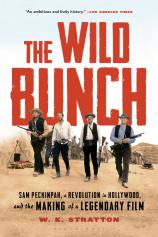Interview: February 13, 2019
This year marks the 50th anniversary of the release of The Wild Bunch, which was named one of the greatest Westerns of all time by the American Film Institute. In his newly published book, THE WILD BUNCH, W.K. Stratton tells the fascinating history of the making of the movie, which was shaped by infamous director Sam Peckinpah and starred such visionary actors as William Holden, Ernest Borgnine, Edmond O'Brien and Robert Ryan. Michael Barson, the Director of Publicity at Poisoned Pen Press, talks with Stratton about his extensive research, which included interviews with many of the surviving cast and crew members; what he considers to be Peckinpah’s single most serious miscalculation in the making of the film; and why he is less than enthusiastic about its upcoming remake, which will be directed by Mel Gibson.
Question: As you recount in THE WILD BUNCH, your research in several cases caught up with some of the original participants just in the nick of time. Of course, many of them had passed away long before you even got started, not least Sam Peckinpah himself. Who would you name as your best "get" in terms of what information he or she was able to supply for this book?
W.K. Stratton: I learned a lot from a number of people who are still around. Talking to Alfonso Arau was really enlightening. The Wild Bunch was his first American film, although he was already a significant TV personality in Mexico. This led me to appreciate the accomplishments achieved by many of the Mexican actors who worked on The Wild Bunch, accomplishments that were largely unknown to audiences in the U.S. Alfonso got to know Sam Peckinpah through The Wild Bunch, and Peckinpah became a kind of mentor to him as Alfonso began directing his own pictures. Some of the things Alfonso learned from Peckinpah paid off when a movie Alfonso directed, Like Water for Chocolate, won many awards, including a nomination for an Oscar as best foreign language film. Alfonso shared with me many telling details about how Peckinpah worked, such as requiring an actor of the stature of William Holden to feed Alfonso his lines when Alfonso's medium shots and close-ups were being filmed.
Q: Before The Wild Bunch reached theaters in 1969, a few neorealist Westerns preceded it. In particular, there was Richard Brooks' The Professionals from 1966, which offered a splendid cast and a profoundly cynical story. Do you think Peckinpah might have seen this movie and been influenced at all by it?
WKS: Yes, Peckinpahhad seen it. I'm not sure of his opinion of it. It was likely irritating to him in one regard: The success of The Professionals was one of the factors that led to Lee Marvin pulling out of The Wild Bunch (Marvin was to play Pike Bishop). Both Marvin and his agent thought that the part of Bishop was too similar to his role in The Professionals. I do know that he did not like The Magnificent Seven, although it featured Steve McQueen and James Coburn, both of whom had important collaborations with Peckinpah later. Both movies proved that there was a substantial audience for border Westerns, so that was in part an influence.
A more significant influence on Peckinpah was Sergio Leone's first film in the Clint Eastwood trilogy, which was released in the U.S. as A Fistful of Dollars. He listed it as a film that influenced The Wild Bunch. The so-called Man with No Name trilogy (a misnomer, of course, for Eastwood actually had a name in each of the Leone films) was released in the U.S. by United Artists in 1967 and '68 (a couple of years after they played in Europe). It's unclear if Peckinpah saw the second one before he started production on The Wild Bunch. Likely not, because he was very busy at the time. Most Americans didn't have a chance to see the last one, The Good, the Bad and the Ugly, until January 1968. Almost certainly he didn't see it until after he'd finished The Wild Bunch.
Peckinpah went on record as saying that Shane was the Western he most admired. There were certain elements that you see in Shane that turn up in The Wild Bunch, most particularly the realistic portrayal of violence in the fistfight scenes involving Ben Johnson and the death scene with Elijah Cook Jr. By the way, Peckinpah was not a fan of John Ford's late Westerns, The Searchers and The Man Who Shot Liberty Valance. He thought Ford's best Western was My Darling Clementine. As a young man, Peckinpah was heavily influenced by Wild Bill Wellman's The Ox-Bow Incident. In ways, it was the movie that got him interested in filmmaking.
Q: You detail the constant push-and-pull Peckinpah endured with the Warners' home office during the lengthy and difficult filming. With the benefit of 50 years’ hindsight, what do you consider to be Peckinpah's single most serious miscalculation in the making of the movie?
WKS: The "sore thumb" in the movie involves the use of the Río Nazas as a substitute for the Río Grande. As the bunch flees Texas for Mexico and swim their horses across what's supposed to be the Río Grande, it's clear that the river is flowing from left to right. Any time you cross from Texas into Mexico, the Río Grande will be flowing right to left. It's a faux pas any longtime resident of Texas would notice immediately. Peckinpah was asked about it at his last public appearance, a retrospective of some of his movies at Rice University in Houston. He said that the crossing was shot by the second unit, presumably with stuntman Whitey Hughes as the second-unit director. He said the American stuntmen who were supposed to double for the bunch swimming their horses across the river refused to do it because the water was high and the current swift. He said some of the Mexican stuntmen volunteered to do it, and they got to the other side, but it was shot from the wrong side of the river. For continuity's sake, he had to set up the bridge explosion sequence with the river flowing the wrong way as well.
Beyond that, I think Peckinpah’s biggest miscalculation was trusting his producer, Phil Feldman, who opened the door to allow him back in the director's chair after he'd been blacklisted following The Cincinnati Kid debacle. But Feldman began second-guessing Peckinpah almost immediately after the film company arrived in Mexico. Later, Feldman ordered scenes removed from the picture in order to shorten it without consulting with Peckinpah, which weakened The Wild Bunch in ways. Fortunately, the version we have access to now has those scenes restored.
Q: The Wild Bunch has long since achieved classic status, even if the audiences of 1969 were slow to embrace it. In the 50 years since, what would you name as the three or four best Western films to follow The Wild Bunch?
WKS: Hmmm, this probably changes from day to day, but today I'd say Robert Altman's McCabe & Mrs. Miller (which I think is a great movie and Altman's best), Robert Aldrich's Ulzana's Raid, and Clint Eastwood's The Outlaw Josey Wales. I'd have to put Peckinpah's own Pat Garrett and Billy the Kid up there too. I thought Bill Wittliff and company did some amazing work adapting Larry McMurtry's LONESOME DOVE into a made-for-TV movie. Eastwood's Unforgiven is a hell of a movie, as is the Coen Brothers' remake of True Grit. There were a number of interesting Westerns that came about in the wake of The Wild Bunch. I'm a fan of many of those, things like Robert Benton's Bad Company. One of those, Fred Schepisi's Barbarosa, deserves more attention that it gets.
Q: Unlike some of Peckinpah's other hit films, like Straw Dogs and The Getaway, no remake of The Wild Bunch has ever been undertaken. Would you say that this movie is, in effect, UN-remakable? If so, why?
WKS: Warner Brothers, sadly, has recently announced a remake of The Wild Bunch with Mel Gibson directing. Sigh... Let's get Judd Apatow to remake Citizen Kane while we're at it. The Wild Bunch can't be remade. Peckinpah was a real auteur (even though he personally thought the auteur theory "is shit"), and The Wild Bunch is the masterwork of a great auteur. Real auteurs don't come along very often. Part of what makes The Wild Bunch work so well is that it's the manifestation of Peckinpah's artistic vision. Beyond that, you simply can't get an actor like William Holden who can bring as much to a role as what he did with Pike Bishop. There's no one around these days as good in front of the camera as Warren Oates. Ben Johnson: He was a real cowboy, a real Westerner, he breathed authenticity. There's no one like him around these days. Who could be better matched to a part than Edmond O'Brien was to Old Man Sykes? Simply put, The Wild Bunch is a great work of American art. You can't knock off real art and have it succeed.
Q: Was there ever a point in the writing of the book when you felt you had hit an obstacle that might block you from ever finishing?
WKS: The only real obstacles I hit were personal ones. I won't go into too much detail, but in ways, aspects of my life have paralleled the lives of Peckinpah and some of his buddies. I've done some reckless things. That kind of stuff caught up with me, and I had to work my way through that while pushing forward with this project. But, as it turned out, I'm happier with this book than anything else I've ever written. Maybe some of my personal trials made this narrative better. As for the research and so forth for the book itself, I hit no obstacles at all. Everyone I wanted to talk to cooperated, with the exception of Bo Hopkins. But that was okay. I had some good fresh material about him (The Wild Bunch was his first movie).
Q: Even if you are unlikely to make the attempt, which film would you name as the one that would most interest you as the subject of a book-length investigation?
WKS: I don't know how much of a market there would be for it, or if there is much resource material available, but McCabe & Mrs. Miller would top my list. It's an amazing movie on many, many fronts. I'll just say this: For all the plaudits awarded to Meryl Streep, I've never seen her give an acting performance to top what Julie Christie did in McCabe & Mrs. Miller. The other movie that I'd be interested in writing a book about would be John Huston's Fat City. But there would be NO market for that, I'm afraid.




